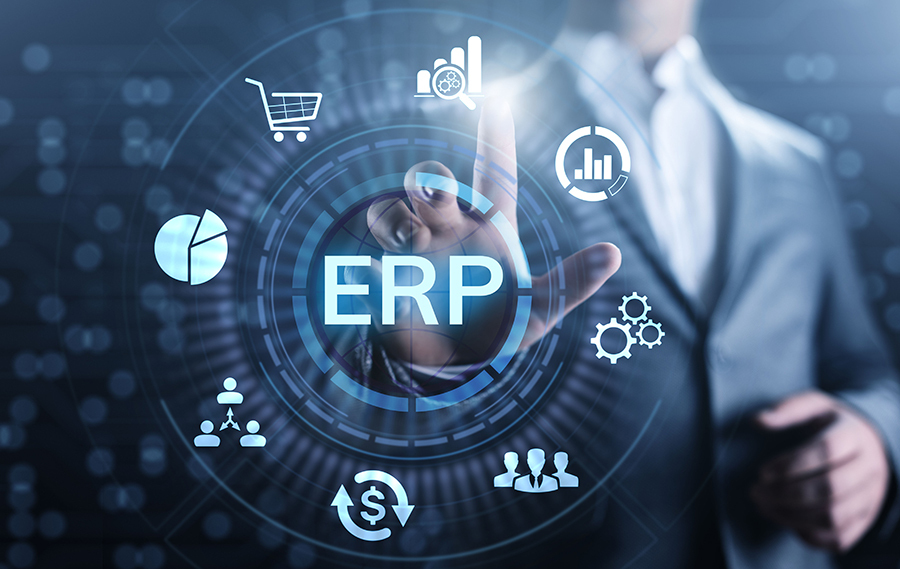ERP stands for Enterprise Resource Planning, and it is a business management system that is designed to model and automate the majority of a company’s processes (finance, sales, logistics, production, etc.). Its goal is to make the planning of all corporate resources easier.
ERP software plans and automates a variety of processes with the goal of integrating information across the organization and removing the complex links between the various departments’ systems.
Companies require tools that provide control and centralization of information now more than ever before in order to make the best decisions for their business processes and strategies. ERPs are a reliable choice for businesses searching for a centralized information management system.
How ERP systems are defined?
ERP (Enterprise Resource Planning) systems are data management systems that integrate and automate many of the business practices associated with a company’s operational or production aspects.
Primary goals of ERP
- Business process optimization.
- All information is accessible in a reliable, accurate, and timely manner (data integrity).
- The ability to share information among all of the organization’s components.
- Reduction of data and re-engineering operations that aren’t necessary.
An ERP’s primary goal is to provide support to business customers, as well as quick response times to their problems and efficient data management that allows for timely decision-making and lower total operating costs.
Why should you utilize up-to-date and appropriate business software?
Whether your firm is huge or small, ERP has various advantages that you may take use of. ERP software is a collection of customisable apps that enables businesses to combine and manage their most vital processes.
ERP increases your output
The objective of an ERP system, also known as an enterprise resource planning system, is to integrate and automate a portion of the operations that occur on a regular basis in any firm. We’re not just talking about accounting here; inventory management, cost projection, operations, and so forth all you can include, depending on the computer program.
Productivity is considerably increased by the speed, precision, and efficiency of various functions, as well as the integration of data. Time is saved, and the workforce can be diverted, with some workers being assigned to other tasks.
This is cutting-edge technology.
The incorporation of cutting-edge technology into the business allows for a variety of advantageous situations.
Improvements in customer service, a better and more efficient organization, adequate resources for the specific needs of the business and workforce, efficient supplier relations, inventory study time reduction, everyone’s access to information, and a reduction in the number of errors are just a few of them.
The rate of return on investment rises
Return on investment, or ROI, is a term that not everyone is familiar with. Its utility, on the other hand, is critical, and the higher it is, the better it will be for our company.
Everyone wants to recoup their ERP investment sooner or later. It is achieved in this context, as previously stated, in the form of productivity, quality of care or free time, clarity in the selection and execution of objectives, and so on.
Increased collaboration and communication
Working with up-to-date and appropriate business software allows you to take use of the communication and collaboration mechanisms that manufacrers have built into the software, allowing employees to communicate with one another.
Because communication is fluid, bidirectional, and in real time, this collection of features is especially valuable when a portion of the workforce works outside the company’s facilities.
Focused IT costs
Despite the fact that ERP software is frequently a substantial investment, it can help you consolidate your IT expenditures and increase productivity. Rather than investing in various systems that require specialized staff, infrastructure, support teams, and licensing, you can consolidate all of these costs into one ERP system.
Furthermore, if you spend more on scattered systems than on a centralized ERP, you may be able to save money on overall IT costs. End users benefit from using a single system since they only have to learn one system instead of engaging with a variety of different apps.
While an ERP can include a wide range of functions such as customer relationship management (CRM), accounting, human resource management, and supply chain management, the system must be modular. This allows you to employ only the elements that are appropriate for your requirements. In essence, an ERP serves as the glue that connects various systems and their data. Some ERPs allow you to combine multiple third-party systems into a single system.
Increased productivity
An ERP can minimize the time and effort it takes for your employees to complete their everyday tasks, in addition to lowering IT and training costs. An ERP solution, when implemented effectively, can drastically simplify or eliminate monotonous manual operations, allowing team members to focus on tasks that have a direct influence on revenue. In addition, the system can aid in the adoption and implementation of industry best practices, ensuring that all efforts are coordinated throughout the organization.
Artificial intelligence (AI), machine learning, robotic process automation (RPA), and other cutting-edge technologies support the automation and smart suggestion features found in many ERP software packages. Yo can manage business tasks such as demand forecasting, purchase order development, and product tracking from manufacturing to delivery with this comprehensive capabilities.
Data quality and security
Data security is one of the most important benefits of an ERP system. After all, data is at the heart of the ERP philosophy. It can improve collaboration across the firm by sharing data across functional silos such as customer service, sales, marketing, and business development. Controlling who can see and edit data is the opposite side of pervasive data access. To safeguard the security of your data, ERP solutions feature built-in controls.
ERP platforms also help to maintain a high level of data security by providing a single point of entry. Combining data from several systems frequently leads to source conflicts, but having a single repository of data improves the accuracy, consistency, and security of your company’s data.
Both on-premises and cloud-based ERP solutions provide a higher level of protection for your company. The ERP software’s database system also enables centralized backup of your vital and sensitive data. Despite popular belief, cloud-based ERP systems can provide an additional degree of protection. Because the cloud manages all of your business data, several providers hire security professionals 24 hours a day to ensure that their servers are secure. Hackers will find it considerably more difficult to carry out test assaults on a public server as a result of this.
It’s critical to weigh the benefits and drawbacks of ERP software when deciding which platform is best for your company. However, don’t let the possible drawbacks deter you from using the technologies that could propel your company forward. If you’re facing trouble to start product research, seek advice from experts in the sector.





